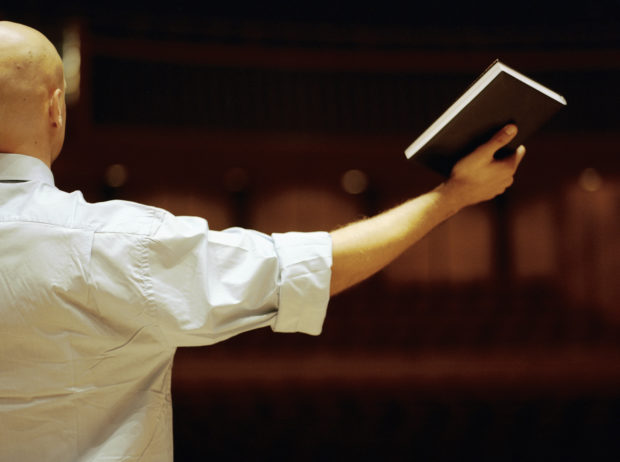Hillsong’s Carl Lentz Can’t Keep God to Himself
Madeline Simpson | mms2331@columbia.edu

Carl Lentz enters the stage of Hillsong NYC in the middle of a worship song.
In a light-wash denim button-down and black skin-tight jeans, he worships onstage. He stands behind the worship leaders and raises his hands, his body almost convulsing with the rhythm as he dances and sings. He wears a few silver necklaces (one with a cross dangling from it) and a red bracelet.
When the music fades, he breaks through the line of musicians in front of him and shouts with a slight southern twang.
“Come on! God is good! If you believe that, raise your voices!”
The crowd roars in response. He steps back behind the musicians and the music continues.
Lentz is a celebrity pastor. His Instagram page boasts a blue checkmark, a follower count of 642,000, pictures of his son hanging out with Justin Bieber and basketball games with rapper Drake.
Evangelical churches, especially evangelical megachurches, are often focused around a big personality who leads the church, teaching every Sunday. The sermons are typically based on Bible scripture and taught using engaging stories and analogies from the pastor’s own life.
When the music portion of the service comes to a close, Lentz takes center stage. He is alone, except for a musician who plays keys throughout the sermon (a low-level melodic hum) and two security guards who sit on the far right and far left mini-staircases leading to the stage.
Behind Lentz, a massive screen projects the words, “I Can’t Keep It to Myself” in neon blue cursive.
The pastor opens with a question to the thousands in the crowd: What can you not keep to yourself?
“If you know someone who is in love, if you know someone who is vegan, if you know someone who is a parent… they can’t keep it to themselves.”
Lentz launches into a story about his daughter’s dance recital, about how he could not sit quietly in his chair during the recital. About how he stood up and cheered for his daughter throughout the group performance.
Then, he directs the audience to a bible verse on the screen from the book of Philemon.
As he reads, the crowd responds.
“Come on, pastor.”
“Amen.”
“Really good.”
“That’s good, pastor.”
Some clap in response to Lentz. Some stand on their feet and shout encouragement at him.
When he says something moving and few respond, Lentz calls out the crowd.
“Come on, somebody! You can clap. Twenty other people did!”
The message is a tutorial on how to evangelize. Lentz begins by comparing a life with sharing the story of Christ (“impact on others” leading to “deeper revelation”) to a life without (“minimal impact” leading to “hollow religious patterns”). He talks about how his parents were part of the “Jesus People” movement of the 1970s, about how their goal was to simply share the Good News about the Lord whenever they could.
The sermon is the third that Lentz preached that day—the church holds two-morning services (9:00 a.m. and 12:30 p.m.) and one evening service (5:00 p.m.). His voice is scratchy and becomes scratchier throughout the sermon. Every word is an inspirational shout. He moves around the stage as he preaches, waving his microphone-holding hand so much that his voice fades in and out of pick-up range.
The ultimate teaching point comes when Lentz tells the crowd that their own stories are all they need to share the Gospel.
“The part of your story that you think disqualifies you qualifies you more than anything else… You have to find your rhythm. Find the way you’re going to use your platform.”
The service was set to end at 6:30 p.m., but at 6:50 p.m., they’re still in the midst of song. By the time Lentz closes his sermon in prayer, his face glistens with sweat.
Over the music, which again fills the theatre, he asks the crowd to bow their heads and calls out to anyone who wants to become a Christian—an altar call.
“Raise your hand if you want to know the Lord tonight. That’s right, raise those hands.”
He leads the hand-raisers through the prayer that Christians believe welcomes you into the house of the Lord, thus guaranteeing an eternity in Heaven. A verse from the biblical book of Romans is displayed on the screen: “If you confess with your mouth, ‘Jesus is Lord,’ and believe in your heart that God raised him from the dead, you will be saved.”
The audience breaks into raucous cheers, welcoming their new brothers and sisters into the family of God.
Lentz disappears behind the row of musicians, who close the night.
